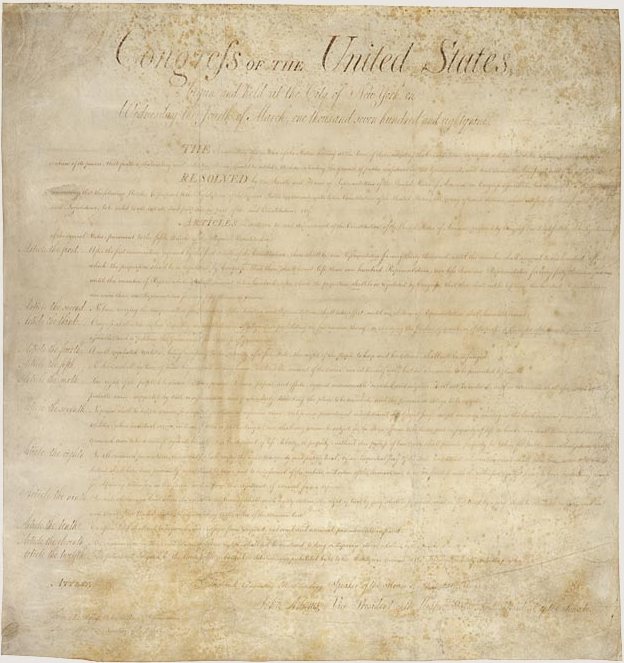Read what the law says and not the lies put out there
2nd Amendment
The only thing ratified by the states in what congress passed was the capital letter M in militia and the placement of the comma.
As passed by the Congress:A well-regulated Militia, being necessary to the security of a Free State, the right of the people to keep and bear Arms, shall not be infringed.
As ratified by the States: A well-regulated militia being necessary to the security of a free State, the right of the People to keep and bear arms shall not be infringed.
Why the states ratified the 2nd amendment.
Its difficult to determine the difference between having a capital M and a lower-case m in the word militia. Generally, a capital letter means a proper noun. In that case, the upper case M, as in the Congressional version, references a particular militia, that being the armed forces of the United States. The lower-case m in the second version would refer to a group of individuals who form an ad hoc army, most likely to oppose the armed forces of the United States. Therefore, it would be okay to keep and bear arms only as part of the official armed forces of the United States. This argument supports a limited version of the right to bear arms; only when serving in the official armed forces of the United States.
The comma in the first version (between the words Arms and shall) also changes the meaning of the amendment. The first version with the comma maintains the reference to the official armed forces of the United States. That is further evidence that the right to bear arms is limited to serving in the official military of the United States. The lack of a comma (between arms and shall) in the second version, implies that there is equality or parity between bearing arms for the official forces of the United States and for personal use of firearms.
It had nothing to do with Slavery.
The States changed the meaning for individuals to keep and bear arms, not just the militia.
Your analysis is flawed, except it is true that the 2nd Amendment had nothing to do with slavery.
Amendment II: House of Representatives, Amendments to the Constitution
These were all state militia and the states didn't make those changes in capitalization and punctuation. In a state militia people feed themselves and volunteer their time for training and conducting militia business. There was universal support to not have a standing army, because they feared it could be controlled by a tyrant. There was no money to pay or feed a standing army. They weren't able to pay the soldiers the money they owed from the Revolutionary War.
The wording of amendments was worked out in committee, before being sent to the houses of Congress for approval. During the process changes were made, like capitalization and punctuation. It's a little known fact, but there were 13 amendments in the Bill of Rights and 3 didn't passed. Once the Bill of Rights passed, the amendments were sent to the states. Some of the original documents survived in state records and what you are seeing are the differences in the documents that have survived from the US Congress and states. Once the amendments were approved by Congress in the form agreed upon, copies of that form were made and sent to the states for approval.
The original proposed 2nd Amendment was:
"A well regulated militia, composed of the body of the people, being the best security of a free state, the right of the people to keep and bear arms shall not be infringed; but no person religiously scrupulous shall be compelled to bear arms."
They couldn't agree on what to do about the religious exemption, so they dropped it and left it to the states to decide. They also dropped "composed of the body of the people" because it was unnecessary.
The original copy of the Bill of Rights as approved by Congress is in the National Archives.

What you put up, is what happened in Congress. It is true what you wrote and part of our History.
What happened after it went to the States to be ratified is what I put up, also true and part of our History.
It is not analysis, it is part of our U.S. History.


